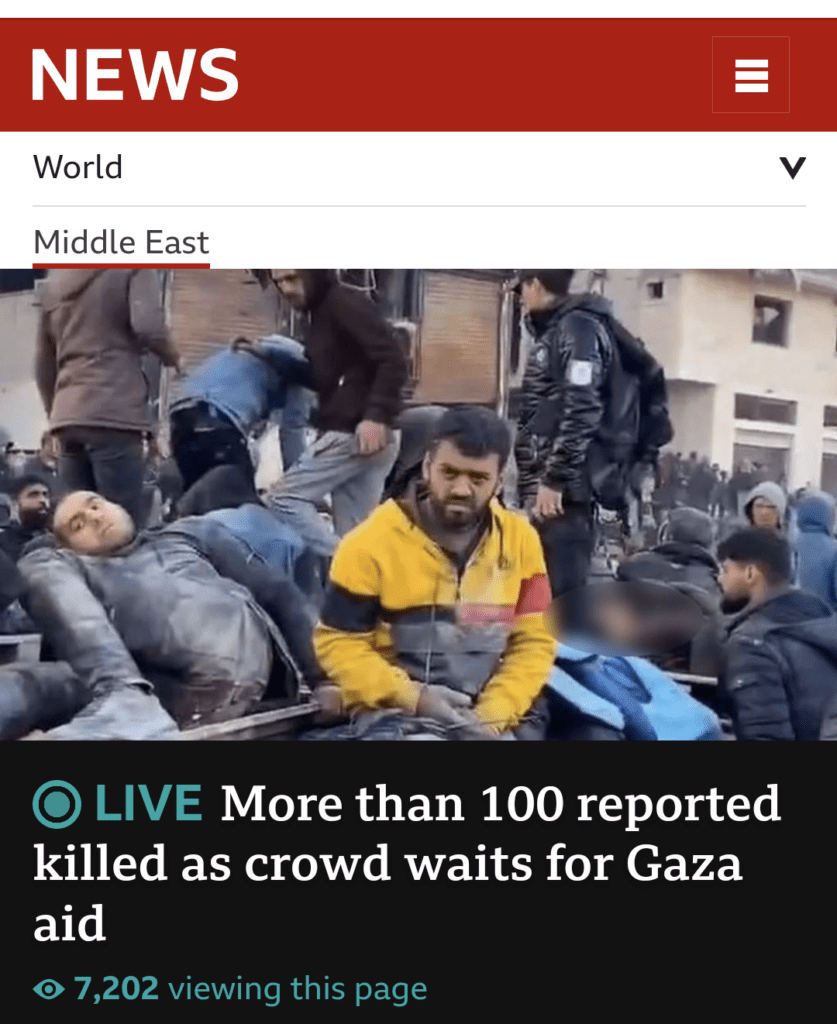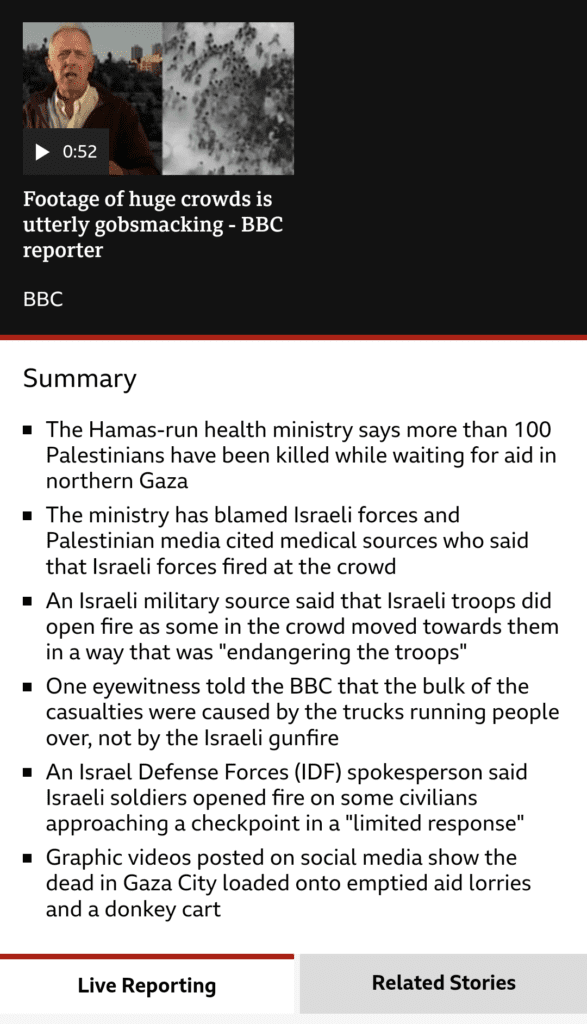
What Happened To The BBC’s Mysterious Gaza Eyewitness?
When scores of Palestinians were gunned down as they tried to get food in Northern Gaza in February, the news made international headlines. Israeli officials were quick to deflect blame, but all the eyewitness accounts implicated IDF troops in the massacre. All except one mysterious eyewitness on the BBC website.
By SC Cook
On February 29th 2024, at al-Rashid Street in Gaza City, 118 Palestians were killed as they desperately tried to get access to basic food supplies. Then as now, hunger was endemic in the north of Gaza after months of a brutal Israeli blockade and bombardment.
Speaking to Al Jazeera, thirty-four-year-old Mohammed al-Simry said that he was left with no choice but to meet the aid convoy as his family, including his four children, were dying of hunger in front of him.
So Mohammed and his cousin left in the night and slept on the Nabulsi Roundabout in anticipation of the convoy’s arrival. Only one of them would return. “Not only did I leave the convoy hungry, I left without a loved family member who had only wanted a bite of bread,” Mohammed said.
The killing of well over a hundred starving, unarmed Palestinians quickly became global news and was labelled the flour massacre. Initial reports indicated that Israeli tanks had suddenly appeared on the scene and opened fire into the crowd, killing hundreds who were there and causing a stampede.
The Israeli state quickly denied this, claiming instead that Palestinians had become unruly, harmless shots were fired into the air and they had killed each other in the ensuing stampede. In the scramble for truth, eye witnesses become one of the most valuable sources for journalists. And the eyewitness reports were damning of Israel.
“We went to get flour. The Israeli army shot at us. There are many martyrs on the ground and until this moment we are withdrawing them. There is no first aid,” one eye witness told Al Jazeera.
“The Israelis just opened random fire on us as if it was a trap. Once we approached the aid trucks, the Israeli tanks and warplanes started firing on us,” another said.
The Al-Jazeera journalist who was on the ground – a rare thing when Israel has barred press entry into Gaza – corroborated this.
RIsmail al-Ghoul said that after opening fire, Israeli tanks advanced and ran over many of the dead and injured bodies. “It is a massacre, on top of the starvation threatening citizens in Gaza,” he said.
Another witness told Channel 4 News that day that Israeli tanks “opened fire on people randomly and directly.”
But the line coming from the Israeli government contradicted these accounts, and changed as the day went on. Initially they stated that: “Early this morning, during the entry of humanitarian aid trucks into the northern Gaza Strip, Gaza residents surrounded the trucks and looted the supplies being delivered.”
Israeli officials eventually admitted that their troops did open fire, but that this was only a dispersal technique and that the deaths were caused in a stampede.
“The tanks that were there to secure the convoy saw the Gazans being trampled and cautiously tried to disperse the mob with a few warning shots,” Israeli forces spokesperson Peter Lerner said on Channel 4 News.
But this was directly contradicted by Dr. Mohammed Salha, the acting director of Al-Awda Hospital where most of the casualties were being treated, said that the majority of patients had gunshot wounds. He told the Associated Press that, of the 176 wounded people taken to the hospital, 142 had gunshot wounds and 34 had injuries that were likely caused by a crowd crush.
Husam Abu Safyia, director of Kamal Adwan Hospital, which was also treating patients, said that the majority had gunshot wounds in their heads, necks or chests.
There were no eyewitness accounts available at the time which backed up the Israeli version of events. Except on the BBC. BBC News had apparently found an eyewitness who corroborated the Israeli version of events, and it promoted this account to the very top of its reporting of the incident.
On its live feed on the day of the massacre, which was the main story on the BBC news website at the time, a headline bullet point read:
“One eyewitness told the BBC that the bulk of the casualties were caused by the trucks running people over, not by the Israeli gunfire.”


The headlines of the BBC live feed on 29th February 2024, which made the eyewitness claim that was never blacked up.
The headline was very clear that the aid trucks were responsible for the majority of the deaths, and that Israeli troops had not engaged in a massacre. It was a bold claim and up until that point, it was a line that had come solely from Israeli sources.
However, the odd thing was that in the entire subsequent live news feed, spanning multiple posts, there was not a single reference to this eyewitness whatsoever. Despite the claim featuring prominently at the top of the article, and its explosive nature, the eyewitness was nowhere to be found.
In an accompanying news article titled “Israel-Gaza War: More than 100 reported killed in crowd near Gaza aid convoy”, an eyewitness is quoted, but they do not support Israel’s claim either.
In a BBC verify article produced the following day claiming to look specifically at eyewitness statements, there was none that backed up the Israeli version of events or who could be claimed to be the BBC’s mysterious eye witness.
In fact the article quoted Dr. Mohammed Salha, who said that the vast majority of casualties had gunshot wounds.
So had the BBC just made up an eyewitness, or completely twisted the words of one in a way that happened to fit the Israeli narrative? When questioned, the BBC has been unable to find the eyewitness. But it says that it refutes the suggestion the source was fabricated.
“We seek to get multiple eyewitness accounts from the ground in the region, particularly where there are conflicting accounts of what is happening or has happened. Once we have new information, we update stories accordingly,” a BBC source said.
But the episode has shone a fresh light on BBC coverage of Israel’s horrific assault on Gaza and its claim to be an impartial media outlet.
In early November, the corporation was accused by more than 100 of its own staff of failing to deliver “accurate evidence-based journalism” when it came to reporting on Gaza.
A letter sent to the broadcaster’s director general, Tim Davie, and CEO Deborah Turness said that Israel was regularly given favourable coverage by the BBC. “Basic journalistic tenets have been lacking when it comes to holding Israel to account for its actions,” they wrote.
In November 2023, eight United Kingdom-based journalists employed by the BBC wrote a letter to Al Jazeera and said the BBC is guilty of a “double standard in how civilians are seen”, and that terms like “massacre” and “atrocity” have been reserved “only for Hamas, framing the group as the only instigator and perpetrator of violence in the region.”
They accused the corporation of showing a total lack of interest in reporting the truth from Gaza and the West Bank. “Little attempt has also been made to fully utilise the abundance of social media content from brave journalists in Gaza and the West Bank,” they said.
Dr Mike Berry, Reader in Media and Communication at Cardiff University School of Journalism said that media coverage of Palestine had followed a particular pattern going back decades.
“Previous research on BBC coverage from the time of the second intifada showed that individual Israeli deaths attracted more coverage than Palestinian fatalities. In addition emotive words such as “atrocity”, “murder”, “lynch-mob” and “barbarically killed were used exclusively by journalists to refer to Israeli deaths,” he told voice.cymru.
“Emerging research on the conflict since October 7 2023 find the same patterns being reproduced with words such as ‘massacre’, ‘atrocity’ and ‘murder’ being employed by journalists to refer to Israeli fatalities but not Palestinian deaths.”
The BBC website is regularly ranked as the most visited news website in the UK, with 559 Million visits in October 2024 alone, an average of 18 million visits per day.
On February 29th, the live feed of the flour massacre was the top story on the website and the mystery eyewitness account was one of the main subheadings. No other eyewitness was referenced, despite multiple named e accounts being available at the time which contracted the Israeli version of events.
To make matters worse, in the video embedded in the feed – which is now unavailable – a BBC reporter directs the audience to the IDF Twitter/X feed as a reliable source of information.
The flour massacre remains one of the deadliest single events for Palestininas in Gaza since October 7th 2023. If a major news organisation can potentially mislead its audience over this, then it raises serious questions about its reporting on other such events as well. This is especially pertinent given it is currently trying to portray itself as a beacon of truth in a world of misinformation.
In the moments following a major international event involving hundreds of deaths, the narrative is formed very quickly and from there on is hard to shake.
Did the BBC play its role in shaping that narrative, and shaping it in such a way that favoured the state that had committed the atrocity?
That question is difficult to answer, but the BBC has never been able to account for its mysterious eyewitness that day.


